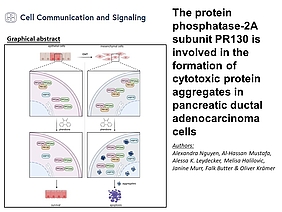New publication from the Krämer lab on how the protein phosphatase-2A subunit PR130 is involved in the formation of cytotoxic protein aggregates in pancreatic ductal adenocarcinoma cells
Nugyen A, Mustafa A, Leydecker A, Halilovic M, Murr J, Butter F, Krämer O (2024) The protein phosphatase-2A subunit PR130 is involved in the formation of cytotoxic protein aggregates in pancreatic ductal adenocarcinoma cells. Cell Commun Signal, doi:10.1186/s12964-024-01597-8
Abstract:
As a major source of cellular serine and threonine phosphatase activity, protein phosphatase-2A (PP2A) modulates signaling pathways in health and disease. PP2A complexes consist of catalytic, scaffolding, and B-type subunits. Seventeen PP2A B-type subunits direct PP2A complexes to selected substrates. It is ill-defined how PP2A B-type subunits determine the growth and drug responsiveness of tumor cells. Pancreatic ductal adenocarcinoma (PDAC) is a disease with poor prognosis. We analyzed the responses of murine and human mesenchymal and epithelial PDAC cells to the specific PP2A inhibitor phendione. We assessed protein levels by immunoblot and proteomics and cell fate by flow cytometry, confocal microscopy, and genetic manipulation. We show that murine mesenchymal PDAC cells express significantly higher levels of the PP2A B-type subunit PR130 than epithelial PDAC cells. This overexpression of PR130 is associated with a dependency of such metastasis-prone cells on the catalytic activity of PP2A. Phendione induces apoptosis and an accumulation of cytotoxic protein aggregates in murine mesenchymal and human PDAC cells. These processes occur independently of the frequently mutated tumor suppressor p53. Proteomic analyses reveal that phendione upregulates the chaperone HSP70 in mesenchymal PDAC cells. Inhibition of HSP70 promotes phendione-induced apoptosis and phendione promotes a proteasomal degradation of PR130. Genetic elimination of PR130 sensitizes murine and human PDAC cells to phendione-induced apoptosis and protein aggregate formation. These data suggest that the PP2A-PR130 complex dephosphorylates and thereby prevents the aggregation of proteins in tumor cells.
Read the full paper here: https://biosignaling.biomedcentral.com/articles/10.1186/s12964-024-01597-8

